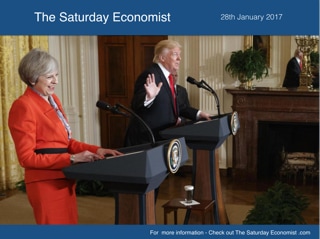 Theresa May was in Washington this week. An episode from "Daisy Pulls It Off". Despite the anxiety of some of the Prime Minister's closest advisers, the visit was a huge success. The special relationship was secured, the President asserted his 100% support for NATO. Brexit is a huge opportunity for the U.K. to be a beacon of free trade and the rule of law! A blow against the "consortium", the U.K. will be at the front of the queue for a deal, putting America first of course. Yep they even held hands outside the White House. Not to worry Melania is in New York. The rule of law will be secured. No torture, despite his personal wishes. General Mad Dog Mattis doesn't really approve. It will be his call. There is a South African proverb, dating from the apartheid era, apparently: "How do you catch an elephant? You catch a mouse and keep beating it, until it admits it's really an elephant." Plans to kidnap and waterboard the President of Mexico, until he agrees to pay for the wall, were suspended when Peña Nieto cancelled the trip. A Twitter forewarning the real giveaway. The Mexicans will pay for the wall, as Sean Spicer the President's Press Secretary explained. The U.S. will impose a 20% tariff on Mexican imports! Really? Once explained American citizens will be paying more for Guacamole, the proposition was deleted from the White House website, along with stuff, about gay rights and abortion. The White House staff will hope the Prime Minister visits more often. It was like Nanny McPhee in the Oval Office. The President was on his best behaviour during the Press Conference. Yes he even read a scripted opening statement. Lured by the promise of a British state visit, tea with the queen and a round of golf at Balmoral, Trump would admit to anything. "You do support NATO 100%" said nanny. "Yes of course" the reply. Love was in the air. Trump loves the U.K., Russia and China. Yes he even loves Mexicans. For the moment, he is not declaring his love for President Putin. Open minded? "I haven't even met the guy". Who says Trump is a bigot! No soon had the nanny left, it was back to watching "Fox and Friends" for policy inspiration. Immigration controls for Muslims, restrictions on Green Cards at the border, putting miners back to work digging "Beautiful Clean Coal". That sort of thing! Let's hope Theresa May has a return ticket soon ... Economic news this week ... growth up 2.1% in Q4 Back in the UK, things are going rather well. Growth in the UK was up by 2.1% in the final quarter of the year, the same level as prior quarter. For the year as a whole growth is around 2.1%. Revisions to business and financial service growth along with an increase in construction output forced the change in outlook for the year ahead. The Bank of England will upgrade their forecasts in the Inflation Report due next week. We now expect growth of not less than 2% for 2017, with an upside potential of 2.4%, as our GDP(O) model explains. We also expect earnings to increase by 3.5% by the end of the year. Inflation CPI basis at 1.6% in December, will spike in the first quarter this year before easing to 2.5% by Q4. So what does this mean for rates? In the U.S. growth in the final quarter of the year was just 1.9%. For the year as a whole, U.S growth is just 1.6%, compared to 2.5% prior year. The Fed is still committed to further rate rises this year. The President's policies will be expansionary and inflationary. In the U.K. the next move for rates will be up. It could be as early as April this year. Economic news this week .. Borrowing on target! Borrowing figures released this week confirmed the Chancellor is on track to better the OBR target for the year. Public Sector net borrowing decreased by £10.6 billion in the nine months to December to a level of £63.8 billion. For the financial year as a whole, we now expect borrowing to be £64.6 billion compared to the latest OBR projection of £65.5 billion. A further reduction to £55 billion in 2017/18 appears to be within the realms of possibility, given the continuance of growth and the pick up in earnings and inflation. Public Sector Debt was £1.698 trillion at the end of December equal to 86.2% of GDP. The Bank of England QE expansion during the year, as always much appreciated, spreading the burden of borrowing ... So what happened to Markets? Markets, were up the Dow closed at 20,090 from 19,806. The FTSE closed at 7,184 from 7,198. Sterling was up against the Dollar to $1.253 from $1.234 and up against the Euro to €1.171 from €1.155. The Euro moved up against the Dollar at 1.069 from 1.067. Oil Price Brent Crude closed at $55.07 from $55.47 The average price in January last year was $37.00. UK Gilts - yields moved up. UK Ten year gilt yields closed at 1.48 from 1.43. US Treasury yields held at 2.50 unchanged from 2.50. Gold closed at $1,189 from $1,204. John That's all for this week. Don't miss the pro-manchester Business Conference in March. We focus on Digital Disruption and the Smart City Challenge. Our next economics presentation is on the 9th February in Manchester. It's usually a sell out. So book now if you can make the list. © 2017 John Ashcroft, Economics, Strategy and Social Media, experience worth sharing. ______________________________________________________________________________________________________________ The material is based upon information which we consider to be reliable but we do not represent that it is accurate or complete and it should not be relied upon as such. We accept no liability for errors, or omissions of opinion or fact. In particular, no reliance should be placed on the comments on trends in financial markets. The receipt of this email should not be construed as the giving of advice relating to finance or investment.. ______________________________________________________________________________________________________________ If you do not wish to receive any further Saturday Economist updates, please unsubscribe using the buttons below or drop me an email at [email protected]. If you enjoy the content, why not forward to a friend, they can sign up here ... _______________________________________________________________________________________ For details of our Privacy Policy and our Terms and Conditions check out our main web site. John Ashcroft and Company.com _______________________________________________________________________________________________________________ Copyright © 2017 The Saturday Economist, All rights reserved. You are receiving this email as a member of the Saturday Economist Mailing List. You may have joined the list from Linkedin, Facebook Google+ or one of the related web sites. Our mailing address is: The Saturday Economist, Tower 12, Spinningfields,Manchester, Eng M3 3BZ, United Kingdom
0 Comments
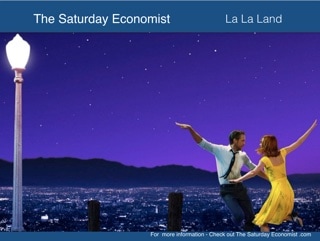 The week started well. Mary and I went to see La La Land. A great film. Two hours and eight minutes of abstraction from the real world of economics and business. A fitting theme for Davos perhaps, as world leaders were chastised ... out of touch with main stream hopes, desires and basic needs of ordinary people around the world. The La La Land theme continued into the week. The Governor of the Bank of England made a speech at LSE on Monday. Precipitous bank action in August had not only avoided a post Brexit crisis but saved 250,000 jobs in the process. Ah what assertions may be made in the absence of the counterfactual. The governor talked much of the Phillips curve. The relationship between unemployment and inflation. A model valid in a closed economy of yore, blown away by the absence of fixed exchange rates and commodity vacillations in a contemporary economy. Along with the J curve and the meandering NAIRU, the Phillips curve is just another "Lambda" to the slaughter or should be. By the end of the week, Trump was in the "White House" and Theresa May was in the "Dog House" of Europe having announced a "wish list" for negotiations. It was a list designed to appease the Tory right rather than a plausible start to the incredibly difficult task ahead. The ask includes, free trade, no customs union, no delaying douaniers, no contributions, no free movement of labour. "Come, if we can pick your brains or you can pick fruit" "Don't come if you can't speak English, sing Rule Brittania or have special needs". Our special needs include, passporting for finance, special deals for motor, aerospace and big pharma. We must have the freedom to be a "Beacon of Free Trade". Capturing new markets, first in line to do deals with the U.S, (putting "America First"). The message to Europe ... deal with us or we will take or Airbus wings elsewhere! Deal with us or we will become a tax haven. We will morph into the Singapore of Europe, albeit without High Speed Broadband. The danger is we become, not a "beacon of free trade" around the world but a "distress signal" fired from a small island off the coast of Europe! Replacing 46% of UK exports won't be easy or quick! The average trade deal takes seven years. Deals with twenty countries - that's almost one hundred and fifty years of bartering ahead! But first we must trigger article 50, then deal with the sordid topic of coin, the near €60 billion cost of separation! Economic news this week ... Inflation set to spike! Inflation increased to 1.6% CPI basis in September up from 1.2% prior month. Inflation will spike in the next three months. The headline rate could double to over 3% in the quarter, just in time for the annual pay round. Goods inflation increased to 0.7% but price pressures are building as a result of oil price rises. At current prices and exchange rates oil prices will be near 90% up over the quarter in sterling terms. Producer input costs increased by 16% in the month. Producer output prices were up by 2.3%. Earnings increased by 2.8% in the latest date to November. Private sector incomes increased by over 3%. Construction earnings increased by 6%. The UK faces an inflationary surge in the first quarter which may force the Bank of England into action. The Governor suggested the next move in base rates could be up or down. Really? US inflation increased to 2.1% in December prompting Janet Yellen to confirm the path of US rates in 2017 is up! The Bank may be forced much earlier than expected. Economic news this week .. full employment looms! Jobs data this week suggest the U.K is nearing full employment with little change in the data month on month. In November, the number of people unemployed was 1.6 million, the rate unchanged at 4.8%. In our forecasts for 2017 we expect the unemployment rate to average 4.8% through the year. The claimant count was just under 800,000 broadly in line with the number of vacancies. The unemployment rate was 2.3%. Lower than pre recession levels in 2008. Conventional theory identifies, three main sectors of unemployment. Cyclical, structural and frictional. In the UK, cyclical unemployment is at a high, structural "u" continues as always along with "frictional" unemployment. As markets near full employment, the short term vacillations become more prevalent. This should not be confused with a structural slowdown. Earnings are rising despite the public sector pay repression. We expect prices to spike in Q1, putting pressure on wage negotiations in the upcoming pay round. Inflation spiking, earnings rising, full employment looming, a trade deficit increasing and base rates at 0.25%? Someone somewhere really is living in La La Land. So what happened to Markets? Markets, were off the Dow closed at 19,806 from 19,881. The FTSE closed at 7,198 from 7,337. Sterling was up against the Dollar to $1.234 from $1.219 and up against the Euro to €1.155 from €1.147. The Euro moved up against the Dollar at 1.067 from 1.063. Oil Price Brent Crude closed at $55.47 from $57.53 The average price in January last year was $37.00. UK Gilts - yields moved up. UK Ten year gilt yields closed at 1.43 from 1.37. US Treasury yields held at 2.50 from 2.42. Gold closed at $1,204 from $1,188. John That's all for this week. Don't miss the Business Conference in March. We focus on Digital Disruption and the Smart City Challenge. Our next economics presentation is on the 9th February in Manchester. © 2017 John Ashcroft, Economics, Strategy and Social Media, experience worth sharing. ______________________________________________________________________________________________________________ The material is based upon information which we consider to be reliable but we do not represent that it is accurate or complete and it should not be relied upon as such. We accept no liability for errors, or omissions of opinion or fact. In particular, no reliance should be placed on the comments on trends in financial markets. The receipt of this email should not be construed as the giving of advice relating to finance or investment.. ______________________________________________________________________________________________________________ If you do not wish to receive any further Saturday Economist updates, please unsubscribe using the buttons below or drop me an email at [email protected]. If you enjoy the content, why not forward to a friend, they can sign up here ... _______________________________________________________________________________________ For details of our Privacy Policy and our Terms and Conditions check out our main web site. John Ashcroft and Company.com _______________________________________________________________________________________________________________ Copyright © 2017 The Saturday Economist, All rights reserved. You are receiving this email as a member of the Saturday Economist Mailing List. You may have joined the list from Linkedin, Facebook Google+ or one of the related web sites. Our mailing address is: The Saturday Economist, Tower 12, Spinningfields,Manchester, Eng M3 3BZ, United Kingdom 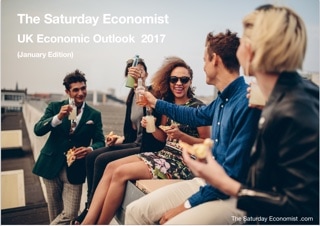 In the UK we expect the economy to have grown by 2.2% in 2016 following growth of 2.3% in 2015. Our central forecast is for growth to slow to 1.8% in 2017, with an upside potential of 2.2%. In the US the recovery continues with growth of 2.2% expected in the year ahead following growth of 1.6% in 2016. We expect inflation to rise early in 2017 prompted by the rise in oil prices and the depreciation of Sterling. The Bank of England expect inflation to peak at around 3% by the first quarter of 2018. NIESR expect inflation to rises to just under 4% be the end of 2017. We expect inflation to rise significantly in the first quarter, ending the year at 2.5% The service sector continues to underpin growth in the economy. Following growth of 2.5% in 2015, we expect service sector growth of 2.2% in 2016 and 2.1% in 2017. Construction output, driven by developments in housing and infrastructure, increased by 3.4% in 2015. We now expect growth of 0.2% value based in 2016 and 0.3% in 2017. Manufacturing output remains almost 6% below the peaks registered in 2008 prior to recession. Following an increase in manufacturing output of 2.9% in 2014, output fell by -0.1% in 2015. We expect an increase of 0.3% in 2016 and 0.1% in 2017. Within the service sector, the leisure sector is expected to show strong growth along with a strong performance in business services, transport and finance. Overall, the UK will experience modest growth in output over the next two years. [We estimate the long term trend rate of growth to be 2.4% following latest data revisions. We do not share concerns about UK productivity.] Our GDP Expenditure model is consistent and balanced with the ONS data. We forecast GDP(E) growth of 2.2% in 2016 and 1.8% in 2017. We continue to offer little hope for the re balancing agenda in our forecasts for growth in expenditure. Household expenditure increased by 2.5% in 2016. We expect growth of 2.7% in 2016 slowing to 2.6% in 2017. Government expenditure increased by 1.3% in 2015. Government expenditure is expected to have increased by 0.9% in 2016 increasing to 1.2% in 2017. Investment increased by 3.4% in 2015. We expect growth of 0.7% in 2016 and 1.3% in 2017 following disappointing Q3 returns. Domestic expenditure increased by 3.4% in 2014 and by 1.9% in 2015. We expect growth of 1.9% in 2016 rising to 2.1% in 2017. Net trade will continue to have a negative impact on growth, with exports increasing at a slightly slower rate than imports. We are forecasting a deficit (trade in goods) of £132 billion in 2016, rising to £136 billion in 2017. The deficit trade in goods will be offset by a surplus trade in services of over £90 billion. The challenge to the current account following the drop in overseas investment income continues, presenting a significant problem to the outlook for sterling over the medium term. We expect the current account deficit to average 5% of GDP in 2017, a level incompatible with base rates at 0.25%. For more information on jobs, borrowing and interest rates download a copy of the Saturday Economist Economic Outlook January 2017. Just click to download. |
The Saturday EconomistAuthorJohn Ashcroft publishes the Saturday Economist. Join the mailing list for updates on the UK and World Economy. Archives
July 2024
Categories
All
|
| The Saturday Economist |
The material is based upon information which we consider to be reliable but we do not represent that it is accurate or complete and it should not be relied upon as such. We accept no liability for errors, or omissions of opinion or fact. In particular, no reliance should be placed on the comments on trends in financial markets. The presentation should not be construed as the giving of investment advice.
|
The Saturday Economist, weekly updates on the UK economy.
Sign Up Now! Stay Up To Date! | Privacy Policy | Terms and Conditions | |
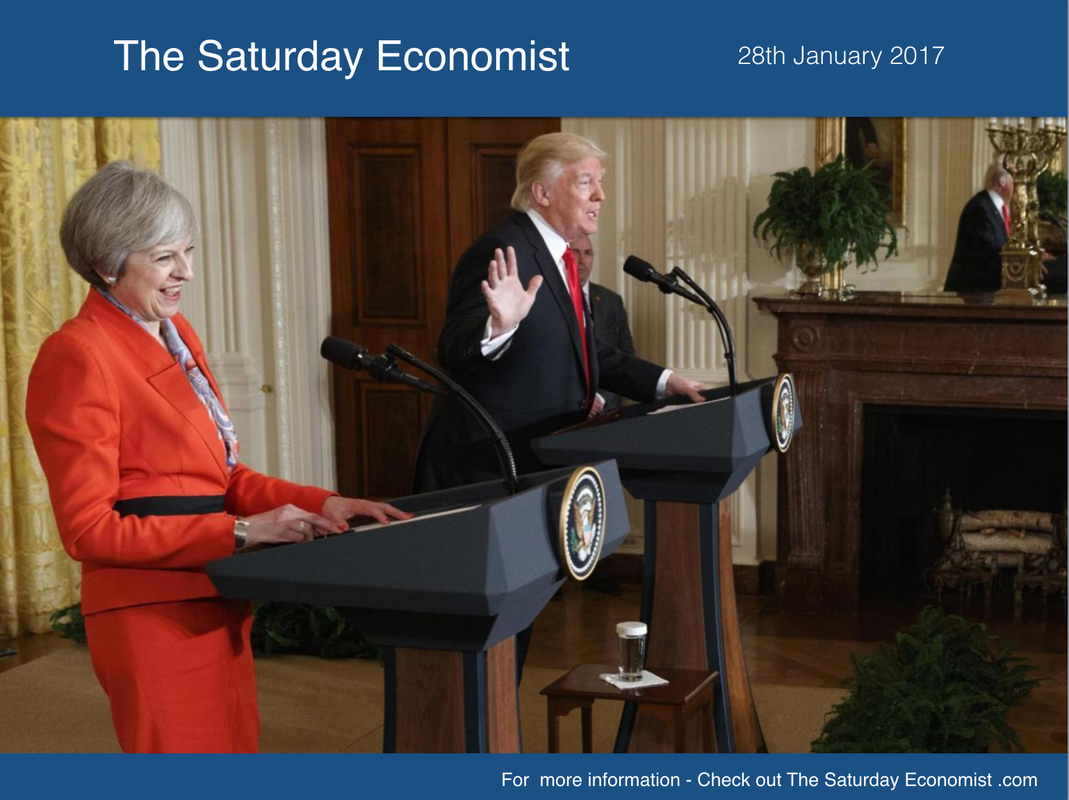
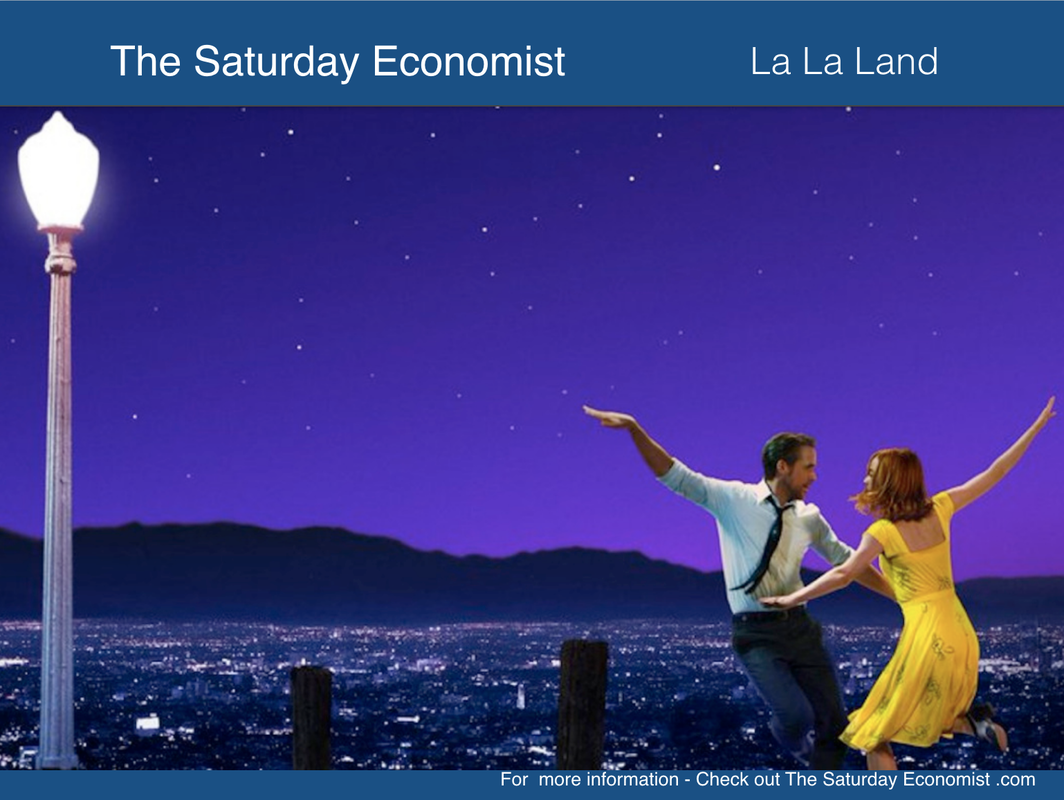
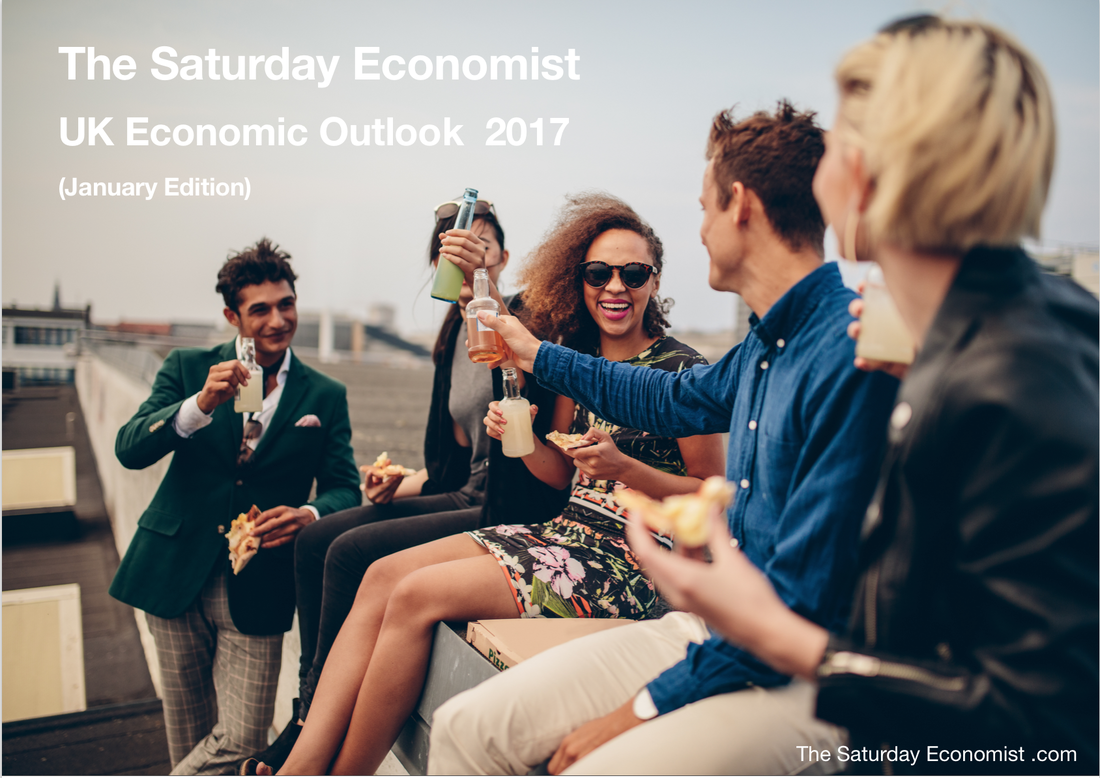
 RSS Feed
RSS Feed